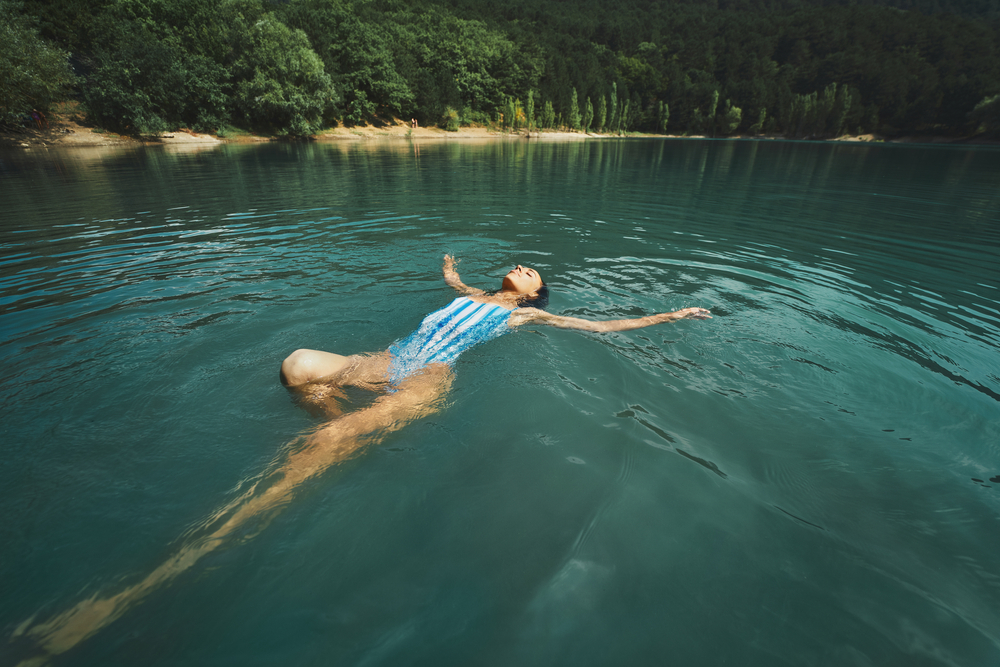Want to boost your health, fitness and mental wellbeing? Head to open waters, says WF’s water baby, Eve Boggenpoel. Discover the endless benefits of wild swimming…
Sliding into the icy water, I gasp as the liquid velvet slowly creeps up my body. There’s nothing for it now but to swim as fast as I can to increase my body temperature. It’s not until I reach the first buoy that my system adapts and I can enjoy the surroundings – overhanging branches, soft grassy verges surrounded by wisp-like reeds and the occasional moorhen passing by.
For 10 years, I was lucky enough to live within walking distance of Hampstead women’s pond in London. I’ve loved wild swimming ever since. Few things can beat that post-swim sensation – physically relaxed and invigorated at the same time, exquisitely present in your body and so very connected to the natural world. In short, a feeling of total contentment.
Rising popularity of wild swimming
Wild swimming has seen a surge in popularity in recent years, increasing three-fold since 2019. Plus, it’s garnered favour among athletes and celebrities, alike. From Linford Christie – who only learnt to swim just before the pandemic – to Jo Whiley and Prue Leith, celebs are flocking to natural waterways. Some even have natural swimming ponds built in their back gardens. For us mortals, there are still plenty of wild swimming options.
‘There are so many different ways to swim. You can become an open-water speed queen, use a triathlon lake as part of your fitness regime, swim in rivers and be carried along by the current, or simply meet up with others for a sense of community, without swimming very far,’ explains Kate Rew, author of The Outdoor Swimmer’s Handbook (£22, Rider).
‘There’s a huge variety of wild swimming options available. So, you can choose what type of swimmer you want to be.’ And when you get started with wild swimming, there are plenty of benefits to be had…

Fitness benefits of wild swimming
‘Swimming pushes all areas of fitness – cardiovascular, strength, endurance and muscle tone,’ says Rowan Clarke, outdoor swimming instructor speaking on behalf of Swim Collective. Once you’re used to the cooler temperatures – Clarke suggests you start open-water swimming in summer so you can gradually increase your cold-water tolerance – you can maximise fitness by adding intervals.
‘It’s the same principle as interval-led running training. Rather than knocking out kilometres at a single pace, improve speed, stamina and endurance by mixing it up a bit,’ he suggests. ‘Try adding short sprints, then recovering with a steady stroke. Or, swim 20 steady strokes, 20 fast, 20 sprint and then back to steady.’
Health benefits of wild swimming
Swimming in cold water, particularly, is laden with health benefits. Low water temperatures (15°C and below) set off a chain reaction in your body, including hyperventilation, an increased heart rate, blood pressure exceeding 200/100 and a massive increase in stress hormones, explains Professor James Goodwin, director of science and research impact at Brain Health Network.
‘Although these effects should be taken seriously, controlled, short-duration and habitual cold-water swimming with generous recovery times has been shown to lower resting blood pressure and benefit the immune system, increasing immune cells called monocytes and leukocytes and resulting in fewer infections. It also benefits the endocrine system, increasing insulin sensitivity and decreasing triglycerides [blood fats that increase heart disease risk].’
Cold water dips also lower inflammation, help alleviate perimenopause and menopause symptoms. Plus, it has even been found to reverse dementia damage in early laboratory trials.
Wellness benefits of wild swimming
As well as the proven mental health benefits of spending time in nature, especially watery environments referred to as ‘blue space’, cold-water swimming improves your mood via something known as post-swimming elation. It may also be anti-depressant in the long term, according to Goodwin. ‘Studies have shown it can increase levels of dopamine, serotonin and beta-endorphins. These are all neurotransmitters that improve feelings of wellbeing,’ he explains.
When you get into cold water, blood moves from the skin surface to your core, to protect your vital organs. This causes your heart to work harder but your body soon adapts. ‘As you breathe through this response, your “rest and digest” or parasympathetic nervous system takes over and you start to swim,’ explains Clarke. ‘In doing so, you are not only boosting your metabolism and sleep patterns, but you’re also teaching your body how to better deal with stress.’
Related: Beginner’s guide to open water swimming
Words: Eve Boggenpoel | Images: Shutterstock







